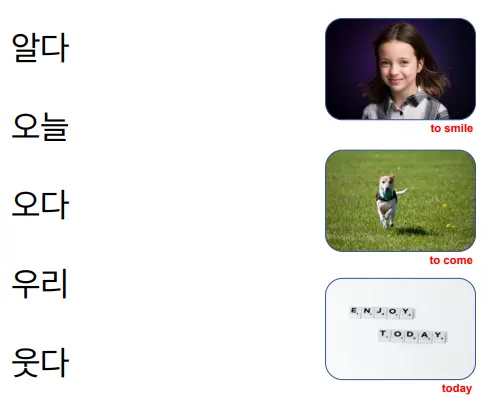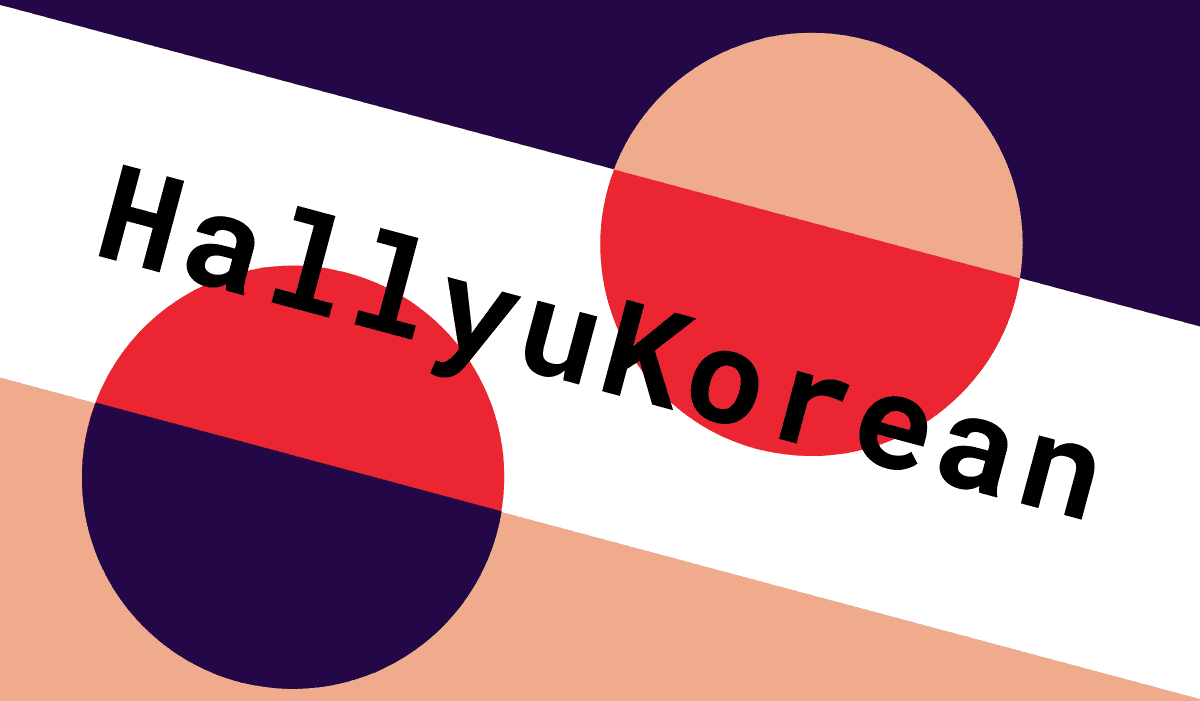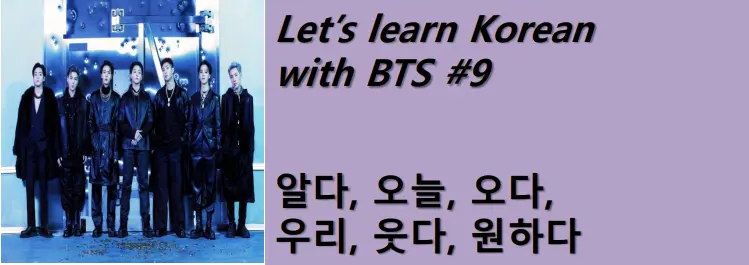Basic Korean words beginning with the consonant ㅇ([i-eung], [∅] or [ng] sound)
Let’s learn Korean words 알다, 오늘, 오다, 우리, 웃다, 원하다 with BTS lyrics.
Click on the image below to listen to all the BTS lyrics used in this post.
알다 [al-da] to know

ⒷⓉⓈ 이미 다 끝난 건 알고 있지만
i-mi da kkeut-nan geon al-go it-ji-man
Although I already know everything is over
*이미(already) + 다(all) +
끝난(끝나다(finish) + ㄴ(functions as a noun modifier)) + 건(것(thing) + 은(topic particle)) +
알고(알다(know) + ~고(auxiliary connective ending)) + 있지만(있(다)(to be) + 지만(but))
(*것 is the most common dependent noun in Korean and means thing.
거 is a shortened form of 것 and 게 is a shortened form of 것이(것+이(subject particle)).
건 is a shortened form of 것은(것+은(topic particle)) and 걸 is a shortened form of 것을(것+을(object particle)).)
오늘 [o-neul] today

ⒷⓉⓈ 오늘 뭐 실수는 없었었나?
o-neul mwo sil-su-neun eop-sseot-sseot-na
Did I make any mistakes today?
*오늘(today) + 뭐(what) +
실수(mistake) + 는(topic particle) +
없었었나(were there none?)
(*뭐 is the shortened form of 무엇. 무엇 is a noun and 뭐 is an adverb or a noun.
무슨 also means ‘what’, but it’s an adjective, so you can use it if you have a noun after it.
To make a verb past tense, you must first remove 다 from the infinitive form of the verb, which gives you the verb stem. Then you must add the correct past tense ending to the verb to make it past tense.
If the last vowel in a verb stem is ㅏ or ㅗ, add 았다 or 았어 or 았어요.
If the last vowel in a verb stem is NOT ㅏ or ㅗ, add 었다 or 었어 or 었어요.
Also, if a verb ends in 하다, change the 하다 to 했다 or 했어 or 했어요 to make it past tense.)
오다 [o-da] to come

ⒷⓉⓈ 얘들아 이리 와
yae-deu-ra i-ri wa
Guys, come here
*얘들아(얘(child, = 아이) + 들(plural suffix) + 아(hey)) +
이리(here) +
와(오다(come) + 아(an imperative ending suffix))
(*얘 is what an adult calls a child or what people of the same age call each other.
In the “noun (usually name) + 아/야”, “아/야” is similar to the English “hey~”.)
우리 [u-ri] we

ⒷⓉⓈ 우리 결혼해
u-ri gyeol-hon-hae
Let’s get married
*우리(we) +
결혼해(결혼(marriage) + 하다(to do))
(*하다(hada, to do) is the dictionary form and there are several conjugations of 하다 in Korean.
1)해라(haera) 2)해(hae) 3)해요(haeyo) 4)하십시오(hasipsio)
해요, 해 are informal and are usually used in everyday conversation.
The politeness level is 1 < 2 < 3 < 4.)
웃다 [ut-tta] to laugh, to smile

ⒷⓉⓈ 내 손을 잡고 웃어
nae so-neul jap-ggo u-seo
Hold my hand and smile
*내(나(I)+의(of), =내) +
손(hand) + 을(object particle) +
잡고(잡다(hold) + 고(and)) +
웃어(웃다(smile) + 어(an imperative ending suffix))
원하다 [won-ha-da] to want

ⒷⓉⓈ 넌 내가 원하는 걸 알지
neon nae-ga won-ha-neun geol al-ji
You know what I want
*넌(너(you) + 는(topic particle), =넌) +
내가(나(I) + 가(subject particle), =내가) +
원하는(원하다(want) + 는(functions as a noun modifier)) + 걸(것(thing) + 을(object particle)) +
알지 (know)
Grammar Reference
*Verb stem + ~고 : verb + and, and then, after
ex)잡고 : 잡다(hold) + 고(and)
‘그리고’ can be abbreviated as ‘verb stem + ~고’. It can be translated as ‘and’, ‘and then’ or ‘after’.
*Noun+하다 : verb
Many Korean nouns that indicate or describe an action or behavior can be combined with 하다 to form verbs.
In some cases, nouns can be turned into verbs by simply adding the verb 하다 (to do).
ex)결혼(marriage) + 하다(to do) = 결혼하다(to marry)
*Noun + ~이/가 : noun + subject particle
ex)내가 : 나(I) + 가(subject particle)
이 for nouns ending in a consonant, 가 for nouns ending in a vowel.
*Noun + ~은/는 : noun + topic particles
ex)실수는 : 실수(mistake) + 는(topic particle)
넌 : 너(you) + 는(topic particle)
은 for nouns ending in a consonant, 는 for nouns ending in a vowel.
*Noun + ~을/를 : noun + object particles
ex)손을 : 손(hand) + 을(object particle)
을 for nouns ending in a consonant, 를 for nouns ending in a vowel.
*Verb stem + 아/어/여라(an imperative ending suffix)
ex)와 : 오다(come) + 아(an imperative ending suffix)
웃어 : 웃다(smile) + 어(an imperative ending suffix)
Imperative form is used when you want to make a request or command.
아/어/여라 is an imperative ending suffix.
*Adjective[verb] stem + ㄴ/은/는/을 + noun : noun that adjective[verb]
ex)끝난 건 : 끝난(끝나다(finish) + ㄴ(noun modifier)) + 건 (것(thing) + 은(topic particle))
원하는 걸 : 원하다(want) + 는(noun modifier)) + 걸(것(thing) + 을(object particle))
ㄴ/은/는/을 is added to verbs and adjectives to allow them to function as noun modifiers
*Adjective[verb] stem + 지만 : but, however
ex)있지만 : 있다(to be) + 지만(but)
~지만 is usually used as a conjunction to link two sentences.
Quiz. Linking words to images

BTS music video to enjoy
Well done for making it this far.
Watch the EPILOGUE : Young Forever music video above and see if you can hear “오늘 뭐 실수는 없었었나?”, which you learned today.



